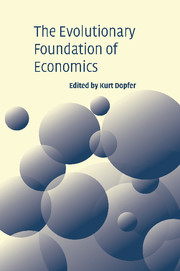Book contents
- Frontmatter
- Contents
- List of contributors
- List of figures
- List of tables
- Prolegomenon
- I Ontological foundations
- II A framework for evolutionary analysis
- 8 Towards an evolutionary theory of production
- 9 Learning in evolutionary environments
- 10 The evolutionary perspective on organizational change and the theory of the firm
- 11 The self-organizational perspective on economic evolution: a unifying paradigm
- 12 Evolutionary concepts in relation to evolutionary economics
- 13 Understanding social and economic systems as evolutionary complex systems
- 14 Perspectives on technological evolution
- 15 Evolutionary economic dynamics: persistent cycles, disruptive technology and the trade-off between stability and complexity
- 16 Evolutionary theorizing on economic growth
- Index of topics
- Index of names
- References
11 - The self-organizational perspective on economic evolution: a unifying paradigm
Published online by Cambridge University Press: 22 September 2009
- Frontmatter
- Contents
- List of contributors
- List of figures
- List of tables
- Prolegomenon
- I Ontological foundations
- II A framework for evolutionary analysis
- 8 Towards an evolutionary theory of production
- 9 Learning in evolutionary environments
- 10 The evolutionary perspective on organizational change and the theory of the firm
- 11 The self-organizational perspective on economic evolution: a unifying paradigm
- 12 Evolutionary concepts in relation to evolutionary economics
- 13 Understanding social and economic systems as evolutionary complex systems
- 14 Perspectives on technological evolution
- 15 Evolutionary economic dynamics: persistent cycles, disruptive technology and the trade-off between stability and complexity
- 16 Evolutionary theorizing on economic growth
- Index of topics
- Index of names
- References
Summary
Introduction
Evolutionary economists have tended to build upon biological metaphors and analogies in constructing analytical representations of structural change in the economic domain. However, evolutionary biology, with its focus upon selection mechanisms, is limited in its applicability in socio-economic contexts. Because of this limitation, some evolutionary economists have begun to explore a more morphogenic perspective, namely the self-organization approach (see Foster, 1994a). Although this approach has its roots at a more fundamental physical level of enquiry, namely non-equilibrium thermodynamics, it is argued that it offers a more useful analytical representation of structuration for those interested in detecting evolutionary change in time series data. As such, it is not used as a metaphor or an analogy; the self-organization process is present at all levels of scientific enquiry. However, physio-chemical, biological, socio-political and economic self-organization all involve interconnected, but distinct, processes of structuration. For example, economic structuration cannot be understood properly using a physio-chemical self-organization approach, yet economic structures contain dissipative features that they share with chemical compounds.
Generally, as we move upwards from the chemical to the economic, energy/entropy aspects of self-organization have to be overlaid with knowledge/complexity considerations. Indeed, questions arise as to whether self-organization is best viewed as a thermodynamic phenomenon or as a more general process within which energy-entropy interplay is a special case.
- Type
- Chapter
- Information
- The Evolutionary Foundations of Economics , pp. 365 - 390Publisher: Cambridge University PressPrint publication year: 2005
References
- 6
- Cited by



